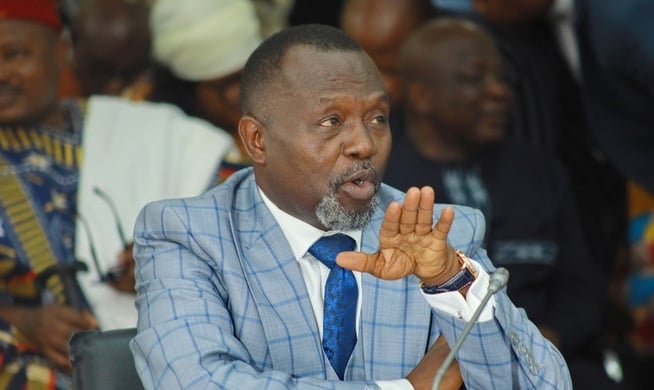The potential dismissal of treason felony charges against Ghanaian activist Oliver Barker-Vormawor has been hinted at by Attorney General and Minister of Justice, Dr. Dominic Ayine. Barker-Vormawor, a prominent figure in the #FixTheCountry movement, faced these charges due to social media posts interpreted as threats to orchestrate a coup d’état. His arrest followed a post where he asserted he would contemplate a coup if the contentious Electronic Transfer Levy (E-levy) was enacted. Dr. Ayine, speaking after his swearing-in ceremony on January 22nd, indicated a willingness to re-evaluate the case, emphasizing that any decision to drop the charges hinges on a comprehensive review of the case file.
Barker-Vormawor’s case stems from his vocal opposition to the E-levy, a proposed tax on electronic transactions that sparked widespread protests and debate in Ghana. The #FixTheCountry movement, of which Barker-Vormawor is a key member, gained momentum by channeling public frustration over economic hardships and perceived government inadequacies. His social media post, expressing his willingness to consider a coup if the E-levy passed, was deemed a serious threat by authorities, leading to his arrest and the subsequent treason felony charges.
Dr. Ayine’s statement suggests a cautious approach to the case, prioritizing a thorough examination of the evidence before reaching a decision. He acknowledged the widespread media coverage of Barker-Vormawor’s statement, emphasizing the need to scrutinize the compiled evidence to determine the validity of the charges. This measured response underscores the importance of due process and the need to avoid politically motivated prosecutions.
The Attorney General’s commitment to reviewing the docket signifies a potential shift in the government’s handling of the case. While stopping short of guaranteeing the charges will be dropped, Dr. Ayine’s willingness to consider such action indicates a recognition of the potential for overreach in the initial prosecution. His emphasis on forming an opinion based on the evidence underscores a commitment to upholding the rule of law and ensuring justice is served.
The case highlights the complex interplay between freedom of expression and national security concerns. Barker-Vormawor’s social media post, while arguably inflammatory, raises questions about the appropriate response to dissenting voices, particularly in the context of socio-political unrest. The potential for such expressions to incite violence must be balanced against the fundamental right to criticize government policies. Dr. Ayine’s careful approach reflects the delicate nature of this balance.
Furthermore, the case underscores the growing role of social media in political discourse and activism. Barker-Vormawor’s use of online platforms to express his views, and the subsequent reaction from authorities, exemplifies the increasing impact of social media on political landscapes. The case raises important questions about the regulation of online speech and the potential for its misuse, while also highlighting its power to mobilize dissent and amplify calls for change. The Attorney General’s decision, following his review of the case, will have significant implications for the future of online activism in Ghana and beyond. It will set a precedent for how governments respond to potentially inflammatory online rhetoric and will likely influence the ongoing debate surrounding freedom of expression in the digital age.














